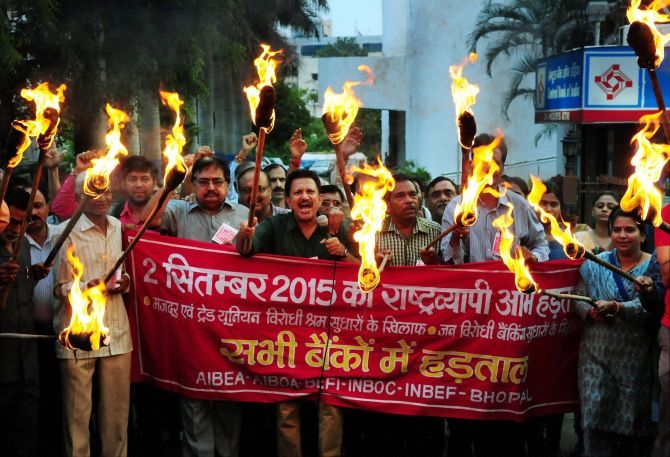With the Congress already opposed to the proposed law, regional parties might become the swing factor, says T N Ninan.

After running the gauntlet on demonetisation, the government may be about to start on another major -- no less contentious -- gambit: to change the country’s laws governing industrial labour.
For nearly three years now, one of the primary criticisms directed at the Narendra Modi government has been its failure to address this issue, presented by critics as an important reason for manufacturing activity not taking off as hoped.
That criticism is about to be blunted, though it is uncertain whether the proposals will get through the Rajya Sabha, where the BJP and its allies are still in a minority.
It would be a pity if Parliament does not give its imprimatur, because the proposed changes are what the doctor ordered: offering flexibility in operations to the smaller companies, better compensation for the retrenched, a more representative character for trade unions, and a new framework for minimum wages.
The proposals have been in the works for the best part of two years, and found brief mention in Arun Jaitley’s Budget speech this year.
But the Congress has already declared its opposition. We should be prepared for a parliamentary battle in which the regional parties might become the swing factor.
If the new laws (compressing 44 existing enactments into four broad “codes” on wages, social security, safety regulations and trade unions) do go through, they will come on top of the changes introduced last year for greater flexibility in the working of the textile and garment sectors, and the amendment of the law on apprentices.
This last has put in place a blueprint for the study-cum-work arrangement of the kind that has worked elsewhere: workers earn while they learn, and the training is linked to the prospect of real employment.
This is designed to give a new thrust to the skilling programme, and (it is hoped) increase dramatically the number of apprentices in the system. Among other things, it offers better pay to those who join companies as apprentices.
One proposal that is bound to attract flak was first proposed by Yashwant Sinha in a Budget speech nearly two decades ago: to allow units employing 300 workers (against 100 at present) to shut down operations without having to seek government permission.
If approved, this would take the vast majority of companies out of the framework of a ridiculous law that probably has no parallel in any other country.
The flip side is also something that was first proposed in the 1990s: those who get retrenched should get 45 days’ wages for every year worked (instead of 15 days currently). Retrenchment becomes easier, but much more expensive; so companies will not resort to it lightly.
Other liberalisations proposed include raising the qualifying floor in similar fashion for the application of the Factories Act, for coverage under the law on contractual labour, for the formation of trade unions, and the like. In essence, smaller units will be offered a freer labour market.
The logic is that the binary division of the labour market into organised and unorganised segments (with tight rules for the first and none in the second) would give way to more fuzzy categorisations that enable easier transitions. The hope must be that this will change today’s situation where 90 per cent of the non-agricultural workforce is in the unorganised sector (defined as having fewer than 10 workers in a unit), in which productivity and therefore wages tend to be low.
If this belated but welcome reform measure is not to go the way of the Modi government’s initial effort to undo the land acquisition law that the Manmohan Singh government had got enacted in its last leg, Mr Modi’s team will have to prepare the ground carefully and not tackle Parliament in its usual, take-no-prisoners style.
In the end, it will be a test of whether the prime minister knows how to reach out for support across the floor.











